September 2017: Highlights and Hot Topics

- Whole Community Preparedness, Taking Stock: Yesterday, Today & Tomorrow
-
Transition into Adulthood Conference Takes Place in Asheville
- Read the Newsletter Online
A Message from Our Executive Director
September reminded me why DD Councils are so important. Our members harnessed diverse opinion and broad expertise, embraced collaboration, and informed dialogue and public policy at the local, state and federal levels.
- Council members Bryan Dooley and Cheryl Powell spoke at the Carolina Institute on Developmental Disabilities (CIDD) Community Talk Series and shared their perspectives and insight regarding what constitutes full lives in the community, employment, and why choosing where you live matters.
- Council members met to discuss North Carolina’s proposed Medicaid Managed Care Proposed Program Design. Their professional and personal feedback, along collaboration with other intellectual and developmental disability (I/DD) groups, informed NCCDD’s submitted comments.
- As the US Senate Finance Committee convened to discuss the Graham-Cassidy bill (see below), NCCDD submitted non-partisan, North Carolina-specific feedback to educate and inform on what these changes may mean for individuals with I/DD in our state.
We know that this is “all in a day’s work” for DD Councils. It’s our job to represent the more than 185,000 individuals with I/DD in North Carolina in every arena we can. And yet, when I look back at the productivity of our Council, I see the passion for improving lives and the willingness bring differing views together to work toward solutions. I continue to be very proud and frankly, humbled, by the commitment and effort that I see every day.
From September 10-16th, we observed Direct Support Professional Recognition Week. Whether assisting with transportation, food preparation, classroom education needs, and other career and daily affairs, Direct Support Professionals (DSPs) are often the key to opening the doors to an inclusive world for people with I/DD. Please join me in thanking all DSPs – not just in September, but all year round -- for their hard work and dedication for the essential supports they provide.
In October, we will recognize National Disability Employment Awareness Month (NDEAM). Focusing on the theme of “Inclusion Drives Innovation,” NDEAM celebrates the contributions of workers with disabilities and educates everyone about the value of a workforce that engages and includes the skills and talents of people with disabilities. NCCDD in collaboration with the NC Division of Vocational Rehabilitation will be launching a year-long campaign promoting supported employment for people with I/DD and employers who are building diverse, inclusive workplaces. Stay tuned!
As always, we love hearing from the community about your thoughts, events and even your ideas on what can make your community a more inclusive place to for people with I/DD to live, work and play. Contact us here.
Chris Egan
Executive Director
State
The Legislature was back in session in August and approved new maps for election of House and Senate members. Instead of the typical process, in which Governor Roy Cooper had the chance to sign the proposal into law or veto it, the maps skipped over the Governor’s desk and went straight to court. A panel of judges will review them; if they don’t approve of what they see, the judges themselves could create new maps for the State. The legislature will reconvene October 4, 2017. This is not a special session, but a continuation of this year’s regular session which means there are a multitude of items that can be considered.
H403 – Behavioral Health and Medicaid Modifications – is a bill that was not agreed upon before adjournment and can come up again. It contains modifications to LME/MCOs and Medicaid program. This is of particular interest because in order to move forward with the changes to medicaid proposed by the Department of Health and Human Resources, changes to this bill will be necessary.
NCCDD responded to the proposed medicaid plan for integration of physical and behavioral health, as well as long term supports and services. Concerns included access to and choice of medical providers, access to specialty care, adequacy and expertise of the network of providers, and access to navigation for self-advocates and families.
Federal Policy
Health and Long Term Services and Supports
After failing to secure 51 votes, the Senate leadership signaled it will not bring the Graham-Cassidy bill -- its most recent effort to repeal the Affordable Care Act (ACA) and cut and cap the Medicaid program -- to the floor. Proponents of the bill hoped to hold a vote prior to September 30th, when reconciliation instructions allowing such a measure to pass by only a simple majority is set to expire. Earlier the same week, the nonpartisan Congressional Budget Office’s preliminary report stated that Graham-Cassidy would remove more than $1 Trillion from Medicaid over 10 years, reduce consumer protections for many people with preexisting conditions, and leave millions of Americans uninsured.
Meanwhile, Senators Alexandar (R-TN) and Murray (D-WA), chair and ranking member of the the Senate Health Education, Labor and Pensions Committee, will likely resume bipartisan efforts to stabilize health insurance markets and bring down premiums.
Americans with Disabilities Act (ADA)
Earlier this month, the US House Judiciary Committee passed H.R. 620, the ADA Education and Reform Act of 2017. No further action has been taken in the House. H.R. 620 would weaken ` of the ADA (places of public accommodation like movie theaters, hotel, malls, restaurants and so forth) by requiring individuals with disabilities who experience access barriers to send written notice listing the exact provision of the ADA that’s been violated. At the same time, businesses would no longer experience consequences for non compliance. Proponents of this bill point to money damage legal awards as a reason to pass this legislation. However, the Title III of the ADA does not allow for such damages -- individual state laws have made that possible in some cases.
Budget and Appropriations
Earlier this month, the House and Senate passed a short-term continuing resolution to fund government programs through December 8, 2017. This includes DD Councils across the nation. Continuing resolutions are used when the House and Senate have not passed their appropriations bills. While the House is further along in its process, we anticipate significant negotiations will be needed to come to consensus with the Senate.
Whole Community Preparedness, Taking Stock: Yesterday, Today & Tomorrow 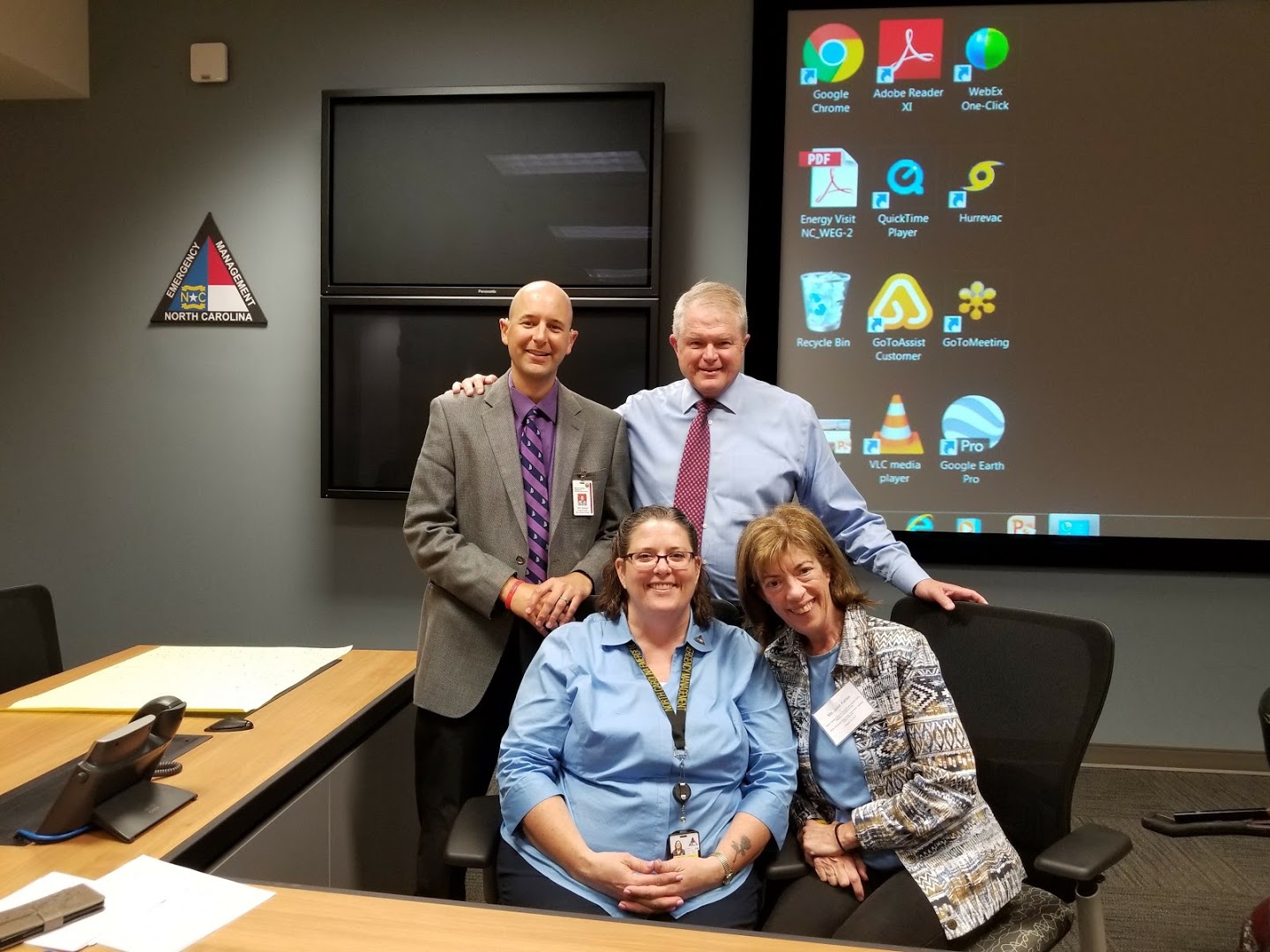 With the recent hurricanes impacting our country and more still churning through the Atlantic Ocean, and with September being National Preparedness Month, emergency preparedness remains important always. On August 23, 60 people participated in the Whole Community Preparedness, Taking Stock: Yesterday, Today & Tomorrow wrap-up event in Raleigh for NCCDD’s Emergency Preparedness for People with Intellectual and Other Developmental Disabilities (I/DD) initiative. The day focused on looking back at the initiative’s accomplishments over the past four years and discussing how to sustain the momentum going forward.
With the recent hurricanes impacting our country and more still churning through the Atlantic Ocean, and with September being National Preparedness Month, emergency preparedness remains important always. On August 23, 60 people participated in the Whole Community Preparedness, Taking Stock: Yesterday, Today & Tomorrow wrap-up event in Raleigh for NCCDD’s Emergency Preparedness for People with Intellectual and Other Developmental Disabilities (I/DD) initiative. The day focused on looking back at the initiative’s accomplishments over the past four years and discussing how to sustain the momentum going forward.
The event featured a panel, titled “The Road Forward”, reflecting on the work accomplished and the partnerships forged; and a panel titled “Lessons to Apply” addressed specific updates on achievements by the initiative’s five C-MIST committees: Communications, Maintaining Health, Independence, Safety & Support and Transportation.
“This is the beginning,” said NC Emergency Management (NCEM) Director Mike Sprayberry, who urged participants, “to continue to work with your emergency management partners.” Cary Community Emergency Response Team (CERT) board member Allison Breedlove mentioned how 35 people perishing in their wheelchairs or nursing home beds in Louisiana during Hurricane Katrina reinforced the need for this type of work.
Jacquie Simmons, the project coordinator for the NC Child Care and Health Safety Resource Center and former chair of the Communications Committee, shared how the updated and accessible Household Emergency Plan document is assisting childcare facilities in preparing for emergencies.
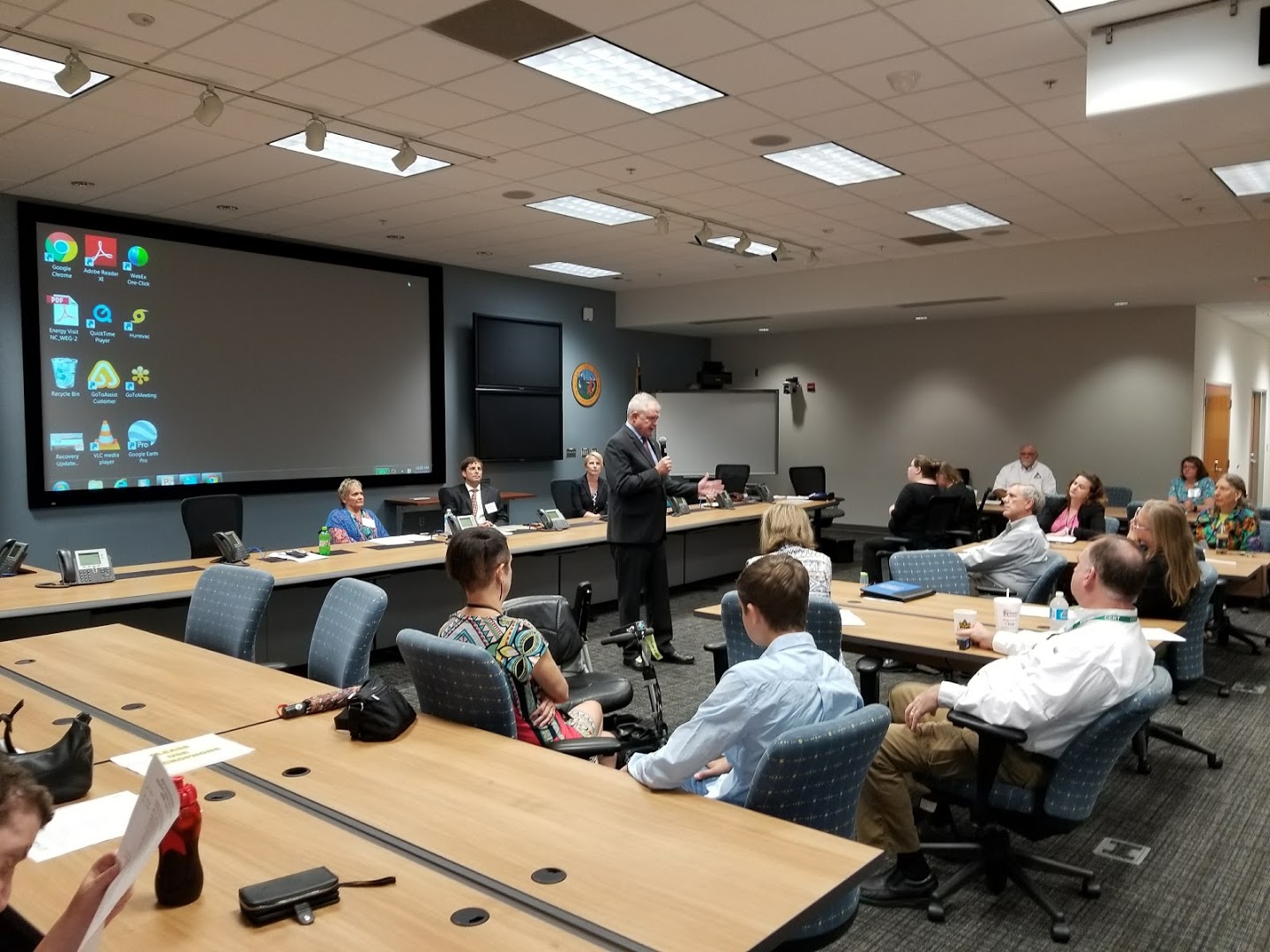 Denise Monkovich Pell of The Arc of North Carolina shared the “I’m Ready” curriculum, a free curriculum and the first of its kind in the country, that caters to individuals with I/DD in helping them be prepared for emergencies. I/DD Grant Coordinator Greta Herring reported on various lessons such as using plain language that individuals with I/DD can understand, and Human Services Manager Abby Cameron mentioned how the state Pharmacy Board now allows pharmacies to renew certain prescriptions early when the governor declares a State of Emergency.
Denise Monkovich Pell of The Arc of North Carolina shared the “I’m Ready” curriculum, a free curriculum and the first of its kind in the country, that caters to individuals with I/DD in helping them be prepared for emergencies. I/DD Grant Coordinator Greta Herring reported on various lessons such as using plain language that individuals with I/DD can understand, and Human Services Manager Abby Cameron mentioned how the state Pharmacy Board now allows pharmacies to renew certain prescriptions early when the governor declares a State of Emergency.
June Issacson Kailes, the Associate Director of the Harris Family Center for Disability and Health Policy at Western University of Health Sciences in California, has served in an advisory capacity throughout the initiative. She closed out the day by reinforcing the message of whole community preparedness for people with I/DD and people with access and functional needs such as senior citizens and individuals who are deaf and hard of hearing and individuals who speak a language other than English.
Participants included individuals with disabilities, staff from NCCDD, Council member Mya Lewis, and various state agencies such as the NC Division of Services for the Deaf and the Hard of Hearing, American Red Cross, Catawba County Emergency Management, and Person County Health Department. Special thanks to the individuals and Cary CERT members who volunteered as ambassadors that day to assist participants in accessing and finding their way through the building.
NCEM Deputy Director Joe Wright stated his desire to see North Carolina be the top state in the country for emergency preparedness, recognizing that, “We’ve made changes at the state level. Enough changes? No.”
But he told the participants, “You’ve made a difference.”
CIDD Hosts Community Talk Series
The Carolina Institute for Developmental Disabilities (CIDD) Community Talk Series in September showcased two members of the North Carolina Council on Developmental Disabilities (NCCDD) – Cheryl Powell and Bryan Dooley. They were joined by emcee McCafferty Kermon and additional panelist, D. Jones, to talk about “Variations of a Full Life: A Panel Discussion with Disability Rights Advocates.”
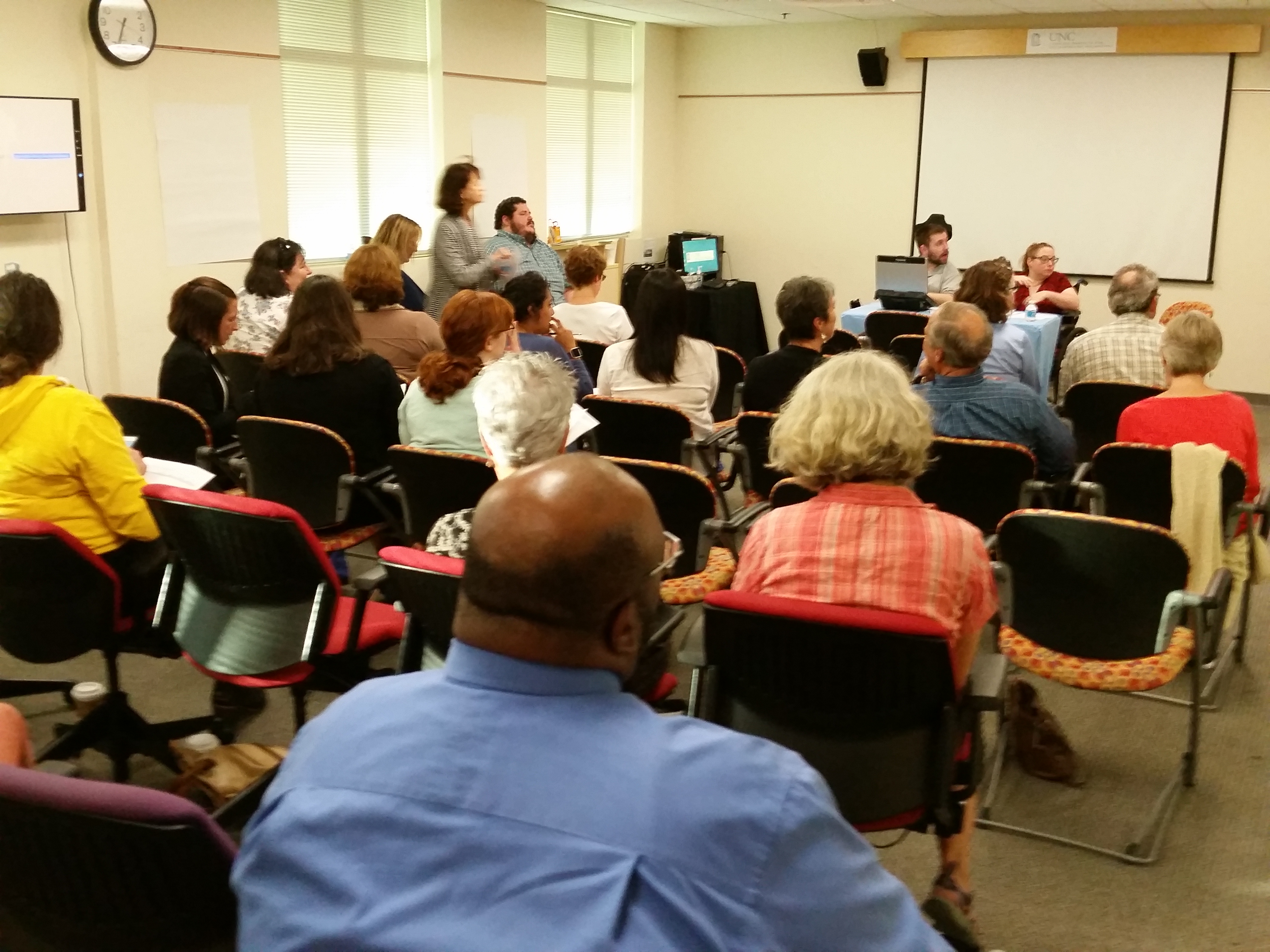 Each panelist was asked what they’d like others to know about disability issues and rights. Powell said, “Don’t be afraid to speak your mind. Nothing will change if we sit and be quiet.” She urged parents of children with disabilities to allow the children to do things, take risks and not hold them back.
Each panelist was asked what they’d like others to know about disability issues and rights. Powell said, “Don’t be afraid to speak your mind. Nothing will change if we sit and be quiet.” She urged parents of children with disabilities to allow the children to do things, take risks and not hold them back.
“We want to all be treated the same,” she added.
Additionally, Dooley addressed comments to teachers, parents and leaders telling them to allow people with disabilities to investigate their dreams and focus on what they can do. He urges people with disabilities to tell others they don’t wish to rely solely on government aid and ask for help in finding jobs.
“We are all inter-dependent, as it should be,” Dooley says.
“Treat us as you treat yourself,” D encourages. She notes that everyone has some challenge – whether it’s a disability or not. She urges teachers not to allow the system to change how you treat each individual student. She asks teachers not to see the behavior or disability but rather see the child.
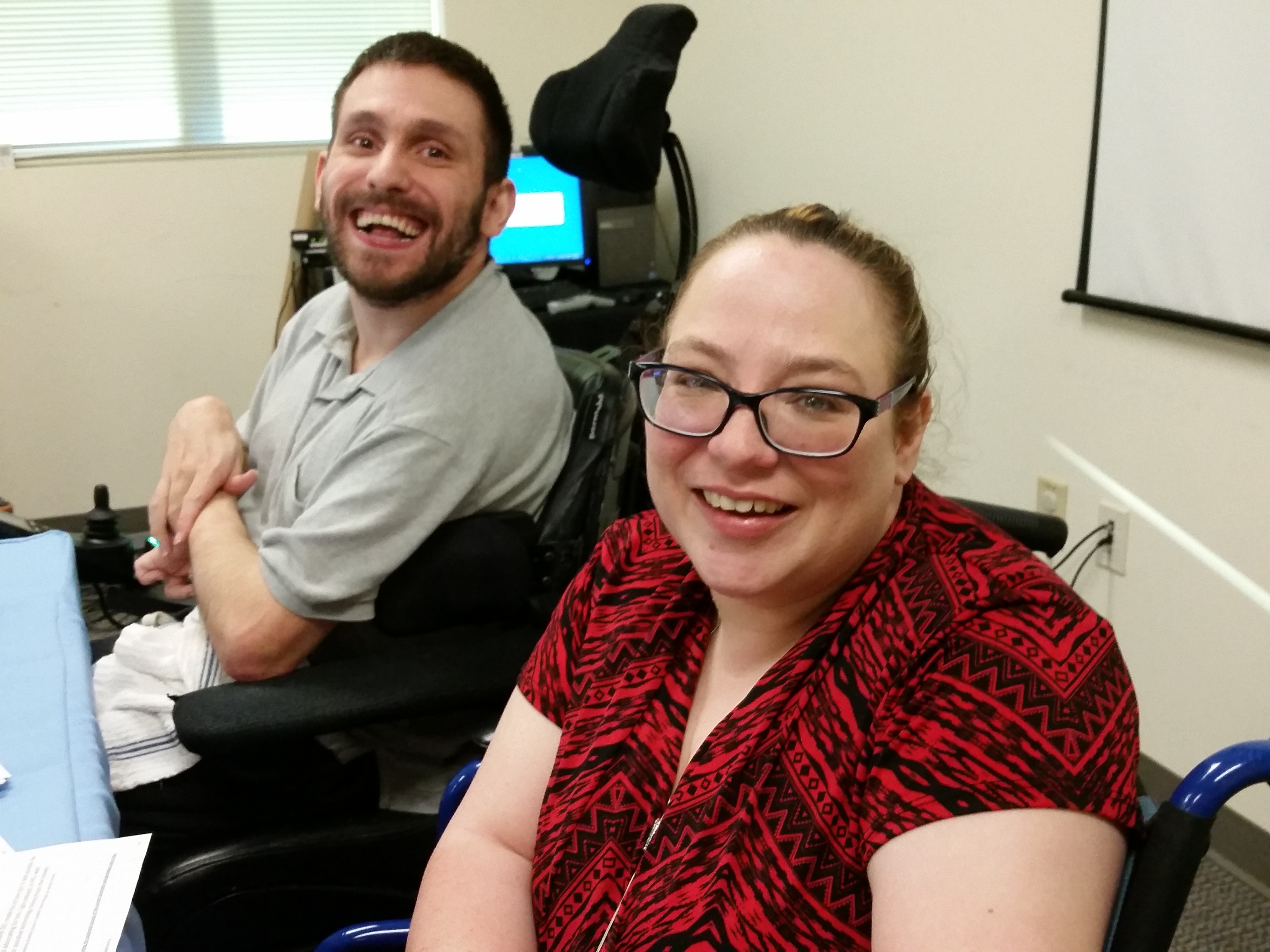 In addition to the Council, Dooley is a board member for Disability Rights NC, the NC Postsecondary Education Alliance and The Adaptables Center for Independent Living in Winston-Salem. As early as high school, Dooley, who has cerebral palsy, was recognized for his disability advocacy work. His “yes I can” attitude allowed him to learn assistive technology and then turn around and train his teachers how to use the programs.
In addition to the Council, Dooley is a board member for Disability Rights NC, the NC Postsecondary Education Alliance and The Adaptables Center for Independent Living in Winston-Salem. As early as high school, Dooley, who has cerebral palsy, was recognized for his disability advocacy work. His “yes I can” attitude allowed him to learn assistive technology and then turn around and train his teachers how to use the programs.
Powell is a founding member of the NC Empowerment Network (NCEN). She serves as a Qualified Professional since earning her degree in social work. She was raised knowing her cerebral palsy didn’t matter, yet when she entered school, she was segregated from ‘normal’ students. This has driven Powell to learn to speak up for herself and for disability rights.
Jones who chairs the Disability Rights NC board and is a physical therapist assistant, describes herself as a fighter. Born weighing just 1 lb. 2 oz., D is on the autism spectrum. “I knew I had problems as a child but my stubbornness helped me achieve my goals,” D said. She admits she worked hard to try to prove she wasn’t a failure.
The panel also spoke to their passions and what disability issues are important to them. Disability history is Dooley’s passion and he hopes to get books on the subject into schools so the history can be taught. Powell said marriage and benefits is her biggest disability rights’ issue and strongly believes in the right to be married to the person she loves and not be told that together, the couples make too much money to receive disability benefits.
Employment for people with disabilities was a sentiment shared across the board. Jones feels strongly about employment and not having to keep her disability a secret because she may need some special on-the-job-accommodation. “We don’t want to be a part of the system that isn’t working for us,” explained D.
The next community talk is on October 11 and will address sleep difficulties in individuals with developmental disabilities. Information about the series can be found at http://www.cidd.unc.edu/Education/CommunityTalk/2017CommunityTalkSeries.aspx
Leadership Development Training Survey – now open
We need your feedback! NCCDD is committed to supporting leadership development for self-advocates, family members and professionals that is values-based and comprehensive. For many years, the NCCDD has funded two specific in-depth leadership development training approaches, including Partners in Policymaking and Advancing Strong Leadership.
As we look to the future of leadership development training, NCCDD seeks input from graduates of Partners in Policymaking and Advancing Strong Leadership. The Council is also interested in the opinions of people who have not attended Partners in Policymaking or Advancing Strong Leadership for I/DD professionals, but who may be interested attending future leadership development training.
With support from the Carolina Institute for Developmental Disabilities (CIDD), UNC Chapel Hill, NCCDD is using a survey to gather your feedback.
Take the survey by October 25, 2017: https://nccdd.org/initiatives/current-initiatives-2017/43-initiatives/518-inclusive-advocacy-leadership-development-iald.html
If an individual cannot access the survey, please call NCCDD's offices for assistance.
- 919-850-2901 (voice/tdd)
- 800-357-6916 (voice/tdd)
Transition into Adulthood Conference Takes Place in Asheville
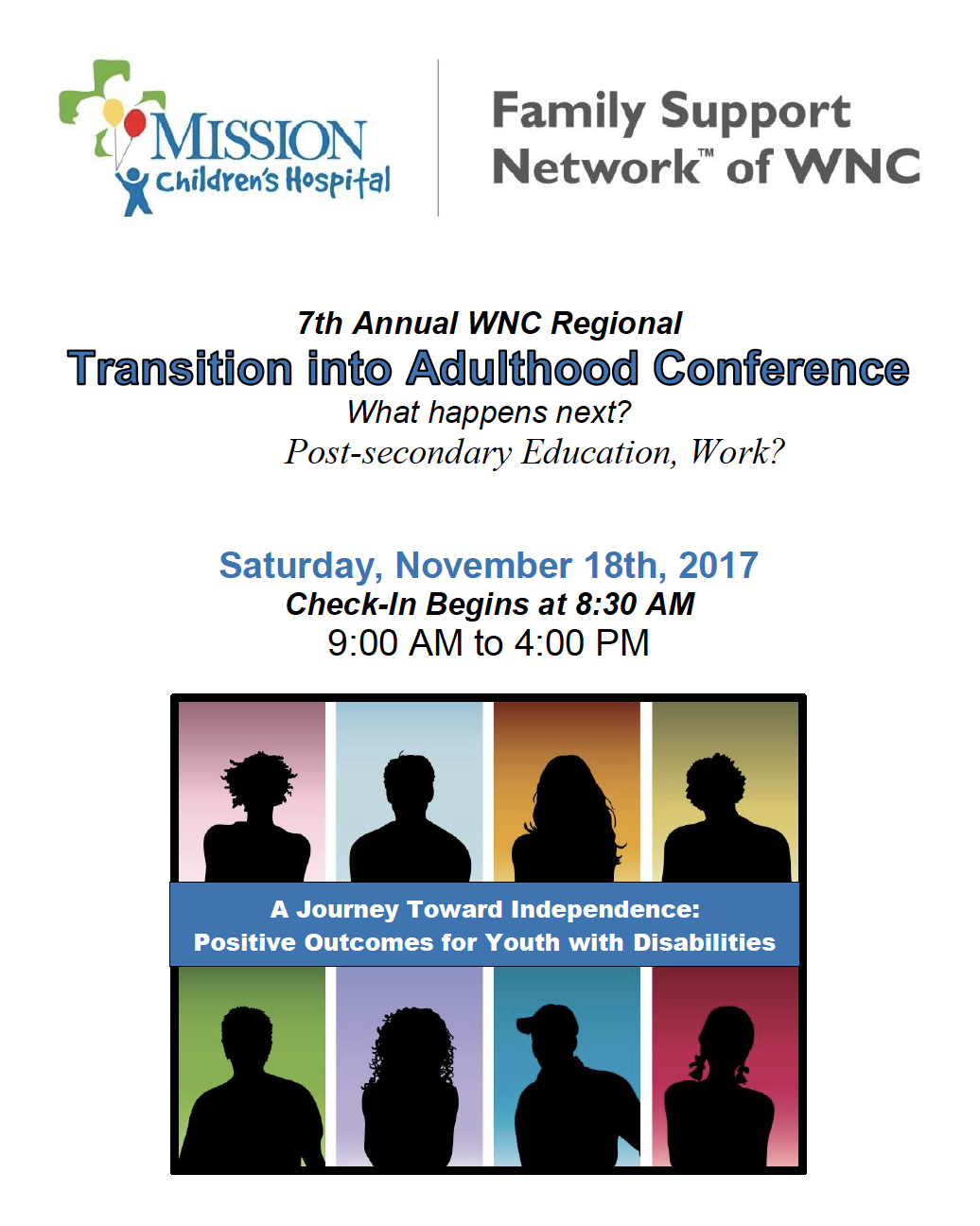 The 7th Annual WNC Regional Transition into Adulthood Conference will take place on November 18, 2017 in Asheville, NC. The primary purpose of this conference is to expand the capacity of schools, agencies and communities, in partnership with youth, young adults and families, in promoting the successful transition of youth/young adults with disabilities to post-school outcomes of employment, post-secondary education and training, community participation and healthy lifestyles.
The 7th Annual WNC Regional Transition into Adulthood Conference will take place on November 18, 2017 in Asheville, NC. The primary purpose of this conference is to expand the capacity of schools, agencies and communities, in partnership with youth, young adults and families, in promoting the successful transition of youth/young adults with disabilities to post-school outcomes of employment, post-secondary education and training, community participation and healthy lifestyles.
Participants will have the opportunity to learn about effective practices to assist youth/young adults with disabilities to explore possibilities, take advantage of their opportunities, and actively advocate for their future.
The conference will feature:
- Keynote and feature presentations
- Breakout sessions
- Sessions and activities designed for youth and young adults
- Family engaging sessions and networking opportunities
- Accommodations and Supports Expo, assistive technology exhibits, resource vendor displays
The keynote speaker will be Kiel Baumbach, an Independent Living Specialist at Disability Partners in Asheville, North Carolina since January 2016. In 2016, Kiel was recognized for his hard work and achievements by receiving the “Employee of The Year” certificate. When Kiel is not helping his peers; he is enjoys his free time with his fiancée Shanna, her two daughters and their pets. He is currently working with consumers on their goals and helping them strive to live independently.
Download the program and schedule for the WNC Regional Transition into Adulthood Conference.
Register for the Transition to Adulthood Conference